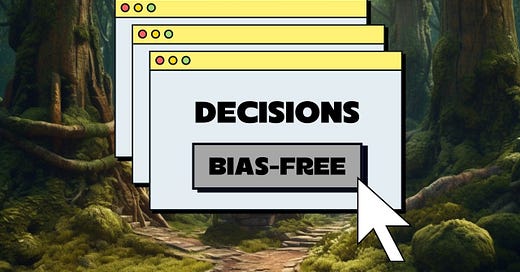🕊️ Bias-free decision making
Hello! Adam Thornhill here. ‘The Podcast Guy’ saving you 10 hours a week.
Enjoy the 77th Podup with the best bits from My First Million.
Great orators often shape our beliefs and actions. But is this sway over our decisions always beneficial or justified? Shaan Puri challenges this notion and offers a more democratic, thought-provoking approach to company decision making.
Great orators always win
If you've seen Hitler or Mussolini give a speech, you know how a great orator can move people to do something they may not believe in. This extends to companies. The person in a meeting who is tall, charismatic, and puts their opinions forward will disproportionately sway what happens.
Shaan Puri
Give other people a chance
There's an antidote to this. It's called the Delphi method:
Propose a topic and provide everyone with the same set of facts
Each person writes down their initial thoughts and statements
The statements are circulated anonymously
Each individual revises their statement based on the new information
The process is repeated until the team reaches what they believe is the strongest, merit-based argument.
Shaan Puri
Have you heard of ThinkingTime?
Slack has similar challenges - whoever's online the most tends to dominate the conversation. An app called ThinkingTime addresses this. It allows you to pose a question and gives everyone a specified time to respond. All the responses are released together to prevent groupthink. These nuances can really change the way a group of people interact.
Shaan Puri
Why it matters
The Delphi method is a great way to improve one-way door decision making at your company:
The time-delay in gathering responses ensures more thoughtful input and avoids rushed decisions.
It accommodates different personalities, allowing quieter, introverted team members an opportunity to voice their ideas.
Anonymity prevents the highest-ranking person from always getting their way, promoting a more merit-based decision-making process.
It prevents teams from blindly following the CEO, whose perspective may not always align with the realities on the ground.
It creates a space for diverse opinions, fostering a more inclusive and effective work culture.
Next steps
Test the Delphi method with a small decision to see if this promotes a wider range of viewpoints and ultimately better decision making. If you find it to be beneficial, try using the Delphi method for larger decisions:
Secure buy-in from another executive team member
Identify a team or department to pilot this for 1-3 months
Record their baseline eNPS before and after the pilot
Interview the department head before and after the pilot
Analyze the pilot's impact and implement it company-wide if successful
Thanks to the Digital Wellness newsletter for making this post possible…
Do you find yourself switching between emails, Slack messages, and social media, without managing to focus on deep work?
Do you ever get home after a long work day, and instead of doing something you really care about (learning a language, a creative hobby), you end up binge-watching Netflix?
Learn how to reclaim your time, attention, and mental health from your tech devices with the Digital Wellness newsletter.
You’ll find neuroscience insights and actionable strategies to make sure your use of technology supports your productivity and well-being.
P.S. To get a head start, join their next workshop: Focus in the age of Digital Distractions
86% of readers have decision-making authority or influence. Reach C-Suite Execs, Directors/VPs, Senior Professionals, and Business Owners/Founders with Podup.
Quotes were pulled at different points of the episode. Sentences were left out to make the narrative more concise. Podup is not associated or affiliated with any podcast.






